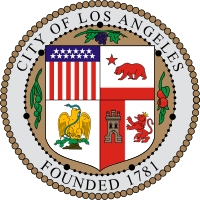1984 Summer Olympics
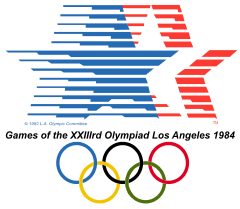 | |||
| Host city | Los Angeles, California, United States | ||
|---|---|---|---|
| Nations participating | 140 | ||
| Athletes participating |
6,829 (5,263 men, 1,566 women)[1] | ||
| Events | 221 in 21 sports | ||
| Opening ceremony | July 28 | ||
| Closing ceremony | August 12 | ||
| Officially opened by | President Ronald Reagan | ||
| Athlete's Oath | Edwin Moses (athlete) | ||
| Judge's Oath | Sharon Heber | ||
| Olympic Torch | Rafer Johnson (decathlete) | ||
| Stadium | Los Angeles Memorial Coliseum | ||
| Summer: | |||
| |||
| Winter: | |||
| |||
| Part of a series on |
|
 |
"Olympic Fanfare and Theme"
composed by John Williams for the 1984 Summer Olympics in Los Angeles and performed by the Boston Pops Orchestra |
| Problems playing this file? See media help. | |
The 1984 Summer Olympics, officially known as the Games of the XXIII Olympiad, was an international multi-sport event held in Los Angeles, California, United States in 1984. When Tehran, the only other interested city on the international level, declined to bid due to the concurrent Iranian political and social changes, the IOC awarded Los Angeles the Games by default. This was the second occasion Los Angeles hosted the games, the first being in 1932.
In response to the American-led boycott of the 1980 Summer Olympics in Moscow, 14 Eastern Bloc countries, including the Soviet Union, Cuba and East Germany, boycotted the Games; only Romania and Yugoslavia elected to attend. For differing reasons, Iran and Libya also boycotted. The USSR announced its intention not to participate on May 8, 1984, citing security concerns and "chauvinistic sentiments and an anti-Soviet hysteria being whipped up in the United States."[2] Boycotting countries organized another large event in June–September 1984, called the Friendship Games; however, not even a single competition was held between July 28 and August 12. Representatives of the organizing countries, the Soviets in particular, underlined it was "not held to replace the Olympics". Elite athletes from the U.S. and USSR would only compete against each other at the 1986 Goodwill Games in Moscow, organized in response to the boycotts.
Where ambitious construction for the 1976 games in Montreal and 1980 games in Moscow had saddled organizers with expenses greatly in excess of revenues, Los Angeles strictly controlled expenses by using existing facilities except a swim stadium and a velodrome that were paid for by corporate sponsors. The Olympic Committee led by Peter Ueberroth used some of the profits to endow the LA84 Foundation to promote youth sports in Southern California, educate coaches and maintain a sports library. The 1984 Summer Olympics are often considered the most financially successful modern Olympics.[3]
The host state of California was the home state of U.S. President Ronald Reagan, who officially opened the Games. He had served as Governor of California from 1967 to 1975. The official mascot of the Los Angeles Games was Sam the Olympic Eagle. The logo of the games featured five blue, white and red stars arranged horizontally and struck through with alternating streaks; it was named "Stars in Motion." These were the first Summer Olympic Games under the IOC presidency of Juan Antonio Samaranch.
On July 18, 2009, a 25th anniversary celebration was held in the main stadium. This celebration included a speech by the former president of the Los Angeles Olympic Organizing Committee, Ueberroth, and a re-creation of the lighting of the cauldron.
Host selection
After the murder of Israeli athletes by Palestinian terrorists in Munich (1972) and significant financial debts of Montreal (1976), few cities by the late 1970s were willing to bid for the Summer Games. Only two cities -Teheran and Los Angeles- made serious bids for the 1984 Summer Games. But before a "winning" city could be anointed in 1978, Tehran, too, dropped out. Hence, the selection process for the 1984 Summer Olympics consisted of a single finalized bid, with the International Olympic Committee accepting the bid of Los Angeles. The bid from Tehran was withdrawn before the selection as a result of Iran's policy changes following the Iranian Revolution and change of the country's ruling system.
Los Angeles had unsuccessfully bid for the two previous Summer Olympics, for 1976 and 1980. The United States Olympic Committee had at least one bid for every Olympics since 1944, but had not succeeded since the Los Angeles Olympics in 1932, the previous time a single bid had been issued for the Summer Olympics.
Torch relay
The 1984 Olympic Torch Relay began in New York City and ended in Los Angeles, traversing 33 states and the District of Columbia. Unlike later torch relays, the torch was continuously carried by runners on foot. The route covered more than 9,320 mi (15,000 km) and involved 3,636 runners, including 200 from the sponsoring company AT&T. Noted athlete O.J. Simpson was among the runners, carrying the torch up the California Incline in Santa Monica. Gina Hemphill, granddaughter of Jesse Owens, carried the torch into the Coliseum, completed a lap around the track, then handed it off to the final runner, Rafer Johnson, winner of the decathlon at the 1960 Summer Olympics. With the torch, he touched off the flame which passed through a specially designed flammable Olympic logo, igniting all five rings. The flame then passed up to cauldron atop the peristyle and remained aflame for the duration of the Games.
Music
John Williams composed the theme for the Olympiad, "Olympic Fanfare and Theme". This piece won a Grammy for Williams and became one of the most well-known musical themes of the Olympic Games, along with Leo Arnaud's "Bugler's Dream"; the latter is sometimes attached to the beginning of Olympic Fanfare and Theme. Composer Bill Conti also wrote a song to inspire the weightlifters called "Power". An album, The Official Music of the XXIII Olympiad—Los Angeles 1984, featured three of those tracks along with sports themes written for the occasion by popular musical artists including Foreigner, Toto, Loverboy, Herbie Hancock, Quincy Jones, Christopher Cross, Philip Glass and Giorgio Moroder.[4]
The Brazilian composer Sérgio Mendes also produced a special song for the 1984 Olympic Games, "Olympia," from his 1984 album Confetti. A choir of approximately one thousand voices was assembled of singers in the region. All were volunteers from nearby churches, schools and universities.
Etta James performed "When the Saints Go Marching In" at the Opening Ceremony.[5]
Vicki McClure along with the International Children's Choir of Long Beach sang "Reach Out and Touch".
Lionel Richie performed a 9-minute version of his hit single "All Night Long" at the closing ceremonies.[6]
Highlights
Arts Festival
The 1984 Summer Olympics was preceded by the 10-week-long adjunct Los Angeles Olympic Arts Festival, which opened on June 2 and ended on August 12. It provided more than 400 performances by 146 theater, dance and music companies, representing every continent and 18 countries. It was organized by then-CalArts President Robert Fitzpatrick.
General
- The opening ceremony featured the arrival of Bill Suitor by means of the Bell Aerosystems rocket pack (also known as a Jet Pack).
- The United States Army Band formed the Olympic rings, waiting to start the opening ceremony.
- As a result of an IOC agreement designating the Republic of China (Taiwan) in the name of Chinese Taipei, the People's Republic of China returned to the summer Olympics for the first time since Helsinki 1952 and won 15 gold medals. Military anthem of China was played for both teams during the opening ceremony. In weightlifting, athletes from the Chinese Taipei and China teams won medals at the same event.
- Eleven athletes failed drug tests at the Los Angeles Games.
- Local Los Angeles artist Rodolfo Escalera was commissioned to create nine paintings depicting the summer games that would later be turned into collectible plates and presented as "The Official Gift of the 1984 Olympics".
Track and field
- Carl Lewis, making his first of four appearances at the Olympics, equaled the 1936 performance of Jesse Owens by winning four gold medals, in the 100 m, 200 m, 4 × 100 m relay and long jump.
- Eighteen-year-old Zola Budd, a South African runner given British citizenship in order to dodge the apartheid-based ban on South African competitors, collided with home favourite Mary Decker in the final of the 3000 m, causing the American to fall. With the crowd booing her for the rest of the race, Budd dropped back and finished well down the order. She was later cleared of wrongdoing and was also declared not culpable by Decker. While the Decker-Budd duel was highly sensationalized, the race itself was won by Maricica Puica of Romania, one of that era's most successful middle distance runners, whose accomplishment was diminished by the controversy.
- Edwin Moses won the gold medal in the 400m hurdles 8 years after winning in 1976.
- Joaquim Cruz won the 800 meter run with a time of 1:43.00 to set an Olympic record.
- Nawal El Moutawakel of Morocco became the first female Olympic champion of a Muslim nation—and the first of her country—in the 400 m hurdles.
- Carlos Lopes, from Portugal, won the Marathon at the age of 37, with a time of 2:09:21, an Olympic record that stood for 24 years. It was the first gold medal ever for Portugal. Gold medal favorite, World Record holder and the then World Champion, Robert de Castella from Australia, finished in 5th place, 1:48 behind Lopes.
- A marathon for women was held for the first time at the Olympics (won by Joan Benoit). The event was considered notable because of Swiss runner Gabi Andersen-Schiess, who – suffering from heat exhaustion – stumbled through the last lap, providing dramatic images.
- Daley Thompson apparently missed a new world record in winning his second consecutive gold medal in the decathlon; the next year his score was retroactively raised to 8847, giving him the record.
- Sebastian Coe became the first man to win consecutive gold medals in the 1500m.
Other sports
- The first gold medal to be awarded at the Los Angeles Olympics was also the first-ever medal to be won by an athlete from China when Xu Haifeng won the 50 m Pistol event.
- Archer Neroli Fairhall from New Zealand was the first paraplegic Olympian at any Olympic Games, coming 35th in the Women's individual event.
- Synchronized swimming and rhythmic gymnastics debuted in Los Angeles as Olympic events, as did wind surfing.
- Li Ning from the People's Republic of China won 6 medals in gymnastics, 3 gold, 2 silver, and 1 bronze, earning him the nickname "Prince of Gymnasts" in China. Li would later light the Olympic Cauldron at the 2008 Olympics.[7]
- Steve Redgrave won his first title in rowing of the record five he would go on to win in five Olympic competitions.
- Victor Davis set a new world record in winning the gold medal in the 200-meter breaststroke in swimming.
- Mary Lou Retton became the first gymnast outside Eastern Europe to win the gymnastics all-around competition.
- In men's gymnastics, the American team won the Gold Medal.
- France won the Olympic soccer tournament, defeating Brazil 2–0 in the final. Olympic soccer was unexpectedly played before massive crowds throughout America, with several sell-outs at the 100,000+ seat Rose Bowl. This interest eventually led to the US hosting the 1994 FIFA World Cup.
- The Soviet-led boycott affected weightlifting more than any other sport: 94 of the world's top 100 ranked lifters were absent, as were 29 of the 30 medalists from the recent world championships. All 10 of the defending world champions in the 10 weight categories were absent.
- Future Dream Team members Michael Jordan, Patrick Ewing, and Chris Mullin were on the team that won the gold medal in basketball. The 1984 US men's Olympic basketball team was coached by Indiana Hoosiers head coach Bobby Knight.
- Connie Carpenter-Phinney became the first woman to win an Olympic cycling event when she won the women's individual road race.
Post Closing Ceremony Fanfare
- Featured powerful trumpet and choral music as Richard Basehart lent his voice to a rousing monologue.
- Thus Spake Zarathustra blared as a 52-foot diameter scale model UFO appeared and then communicated via sound and light.
- Next, a 7'8" tall man dressed in gray alien costume emerged and saluted humanity's efforts.[8]
- Fireworks[9]
- Handover of the Olympic flag from the Mayor of Los Angeles to the Mayor of Seoul, the host of the 1988 Summer Olympics.
Venues

Los Angeles venues
- Los Angeles Memorial Coliseum – opening/closing ceremonies, athletics
- Los Angeles Memorial Sports Arena – boxing
- Dodger Stadium – baseball
- Pauley Pavilion, University of California, Los Angeles – gymnastics
- Eagle's Nest Arena, California State University, Los Angeles – judo
- Olympic Swim Stadium, University of Southern California – swimming, diving, synchronized swimming
- Olympic Village (athlete housing), University of Southern California
- Los Angeles Tennis Center, University of California, Los Angeles – tennis
- Athletes Village, University of California, Los Angeles
- Albert Gersten Pavilion, Loyola Marymount University, Westchester, California – weightlifting
- Streets of Los Angeles – athletics (marathon)
Southern California venues
- El Dorado Park, Long Beach, California – archery
- The Forum, Inglewood, California – basketball
- Lake Casitas, Ventura County, California – canoeing, rowing
- Olympic Velodrome, California State University, Dominguez Hills, Carson, California – cycling (track)
- Mission Viejo, Orange County, California – cycling (individual road race)
- Santa Anita Park, Arcadia, California – equestrian
- Fairbanks Ranch Country Club, Rancho Santa Fe, California, California – equestrian sports (eventing endurance)
- Long Beach Convention Center, Long Beach, California – fencing
- Rose Bowl, Pasadena, California – soccer (final)
- Titan Gymnasium, California State University, Fullerton, Fullerton, California – handball
- Weingart Stadium, East Los Angeles College, Monterey Park, California – field hockey
- Coto de Caza, Orange County, California – modern pentathlon (fencing, riding, running, shooting)
- Olympic Shooting Range, Prado Recreational Area, Chino, California – shooting
- Long Beach Arena, Long Beach, California – volleyball
- Raleigh Runnels Memorial Pool, Pepperdine University, Malibu, California – water polo
- Anaheim Convention Center, Anaheim, California – wrestling
- Long Beach Shoreline Marina, Long Beach, California – sailing
- Artesia Freeway – cycling (road team time trial)
- Heritage Park Aquatic Center – modern pentathlon (swimming)
- Santa Monica College – athletics (marathon start)
- Santa Monica, California – athletics (marathon)
Other venues
- Harvard Stadium, Harvard University, Boston, Massachusetts – soccer preliminaries
- Navy-Marine Corps Memorial Stadium, United States Naval Academy, Annapolis, Maryland – soccer preliminaries
- Stanford Stadium, Stanford University, Stanford, California – soccer preliminaries
Cost
The Oxford Olympics Study established the outturn cost of the Los Angeles 1984 Summer Olympics at USD 719 million in 2015-dollars.[10] This includes sports-related costs only, that is, (i) operational costs incurred by the organizing committee for the purpose of staging the Games, e.g., expenditures for technology, transportation, workforce, administration, security, catering, ceremonies, and medical services, and (ii) direct capital costs incurred by the host city and country or private investors to build, e.g., the competition venues, the Olympic village, international broadcast center, and media and press center, which are required to host the Games. Indirect capital costs are not included, such as for road, rail, or airport infrastructure, or for hotel upgrades or other business investment incurred in preparation for the Games but not directly related to staging the Games. The cost for Los Angeles 1984 compares with costs of USD 4.6 billion for Rio 2016 and USD 15 billion for London 2012, the most expensive Summer Olympics to date. Average cost for the Summer Games since 1960 is USD 5.2 billion.
Medals awarded
The 1984 Summer Olympic program featured 221 events in the following 21 sports:
|
|
|
|
Demonstration sports
Calendar
- All times are in Pacific Daylight Time (UTC-7); the other two cities, Boston and Annapolis uses Eastern Daylight Time (UTC-4)
| ● | Opening ceremony | Event competitions | ● | Event finals | ● | Closing ceremony |
| Date | July | August | ||||||||||||||
|---|---|---|---|---|---|---|---|---|---|---|---|---|---|---|---|---|
| 28th Sat | 29th Sun | 30th Mon | 31st Tue | 1st Wed | 2nd Thu | 3rd Fri | 4th Sat | 5th Sun | 6th Mon | 7th Tue | 8th Wed | 9th Thu | 10th Fri | 11th Sat | 12th Sun | |
| Archery | ● ● | |||||||||||||||
| Athletics | ● ● | ● ● ● |
● ● ● ● |
● ● ● ● ● ● ● ● |
● ● ● ● |
● ● ● |
● ● ● ● ● |
● ● ● ● ● ● ● ● ● ● ● |
● | |||||||
| Basketball | ● | ● | ||||||||||||||
| Boxing | ● ● ● ● ● ● ● ● ● ● ● ● |
|||||||||||||||
| Canoeing | ● ● ● ● ● ● |
● ● ● ● ● ● |
||||||||||||||
| Cycling | ● ● | ● | ● | ● ● ● |
● | |||||||||||
| Diving | ● | ● | ● | ● | ||||||||||||
| Equestrian | ● ● | ● | ● | ● | ● | |||||||||||
| Fencing | ● | ● | ● | ● | ● | ● | ● | ● | ||||||||
| Field hockey | ● | ● | ||||||||||||||
| Football (soccer) | ● | |||||||||||||||
| Gymnastics | ● | ● | ● | ● | ● ● ● ● ● ● |
● ● ● ● |
● | |||||||||
| Handball | ● | ● | ||||||||||||||
| Judo | ● | ● | ● | ● | ● | ● | ● | ● | ||||||||
| Modern pentathlon | ● ● | |||||||||||||||
| Rowing | ● ● ● ● ● ● |
● ● ● ● ● ● ● ● |
||||||||||||||
| Sailing | ● ● ● ● ● ● |
|||||||||||||||
| Shooting | ● ● | ● | ● ● ● |
● | ● | ● ● | ● | |||||||||
| Swimming | ● ● ● ● |
● ● ● ● ● |
● ● ● ● ● |
● ● ● ● ● |
● ● ● ● ● |
● ● ● ● ● |
||||||||||
| Synchronized swimming | ● | ● | ||||||||||||||
| Volleyball | ● | ● | ||||||||||||||
| Water polo | ● | |||||||||||||||
| Weightlifting | ● | ● | ● | ● | ● | ● | ● | ● | ● | ● | ||||||
| Wrestling | ● ● ● |
● ● ● |
● ● ● ● |
● ● ● |
● ● ● |
● ● ● ● |
||||||||||
| Total gold medals | 9 | 8 | 13 | 10 | 12 | 16 | 25 | 21 | 10 | 5 | 14 | 11 | 20 | 43 | 3 | |
| Ceremonies | ● | ● | ||||||||||||||
| Date | 28th Sat | 29th Sun | 30th Mon | 31st Tue | 1st Wed | 2nd Thu | 3rd Fri | 4th Sat | 5th Sun | 6th Mon | 7th Tue | 8th Wed | 9th Thu | 10th Fri | 11th Sat | 12th Sun |
| July | August | |||||||||||||||
Medal count
These are the top ten nations that won medals at the 1984 Games.
| Rank | Nation | Gold | Silver | Bronze | Total |
|---|---|---|---|---|---|
| 1 | | 83 | 61 | 30 | 174 |
| 2 | | 20 | 16 | 17 | 53 |
| 3 | | 17 | 19 | 23 | 59 |
| 4 | | 15 | 8 | 9 | 32 |
| 5 | | 14 | 6 | 12 | 32 |
| 6 | | 10 | 18 | 16 | 44 |
| 7 | | 10 | 8 | 14 | 32 |
| 8 | | 8 | 1 | 2 | 11 |
| 9 | | 7 | 4 | 7 | 18 |
| 10 | | 6 | 6 | 7 | 19 |
Participating National Olympic Committees


Athletes from 140 nations competed at the Los Angeles Games. The following countries made their first Olympic appearance in 1984: Bahrain, Bangladesh, Bhutan, British Virgin Islands, Djibouti, Equatorial Guinea, Gambia, Grenada, Mauritania, Mauritius, North Yemen, Oman, Qatar, Rwanda, Samoa, Solomon Islands, Tonga, and the United Arab Emirates. Zaire had competed previously as Congo Kinshasa. The People's Republic of China made their first appearance in a Summer Olympics since 1952, while for the first time the Republic of China team participated under the politically made-up name as Chinese Taipei.
The Soviet Union led the Warsaw Pact and other Communist and Socialist countries on a boycott of the 1984 Summer Olympics, in retaliation for the U.S.-led boycott of the 1980 Summer Olympics in Moscow over the Soviet Union's invasion of Afghanistan in 1979. However, a handful of Socialist countries disregarded the boycott and attended anyway. Among them were Yugoslavia (which hosted the 1984 Winter Olympics), the People's Republic of China, and Romania. The fact that Romania, a Warsaw Pact country, opted to compete despite Soviet demands led to a warm reception of the Romanian team by the United States. When the Romanian athletes entered during the opening ceremonies, they received a standing ovation from the spectators, which comprised mostly U.S. citizens. Romania won 53 medals, including 20 golds, more than the nation has in any other Olympics.
The number of athletes representing that nation is shown in parentheses:
Boycotting countries
_boycotting_countries_blue.png)
Fourteen countries took part in the Soviet-led boycott of the 1984 Olympic Games:[11]
.svg.png) Afghanistan
Afghanistan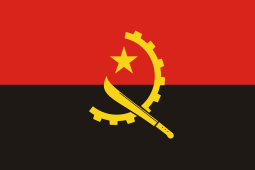 Angola
Angola.svg.png) Bulgaria
Bulgaria Cuba
Cuba Czechoslovakia
Czechoslovakia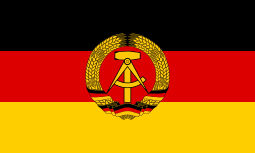 East Germany
East Germany.svg.png) Ethiopia
Ethiopia Hungary
Hungary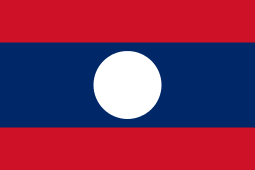 Laos
Laos.svg.png) Mongolia
Mongolia North Korea
North Korea Poland
Poland Soviet Union
Soviet Union Vietnam
Vietnam
Albania, Iran and Libya also boycotted the games, citing political reasons, but were not a part of the Soviet-led boycott. Albania and Iran were the only countries to boycott both the 1980 and 1984 events.
Los Angeles as host city
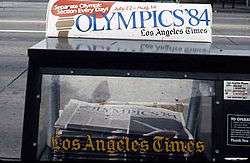
Following the news of the massive financial losses of the 1976 Summer Olympics in Montreal, Quebec, Canada, only Los Angeles and New York City expressed serious interest in hosting the 1984 games. Given only one city per country is allowed to bid for any Games, the USOC vote for an American bid city was essentially the deciding vote for the 1984 Olympics host city. In this case, Los Angeles's bid won by a vote of 55 to 39. New York City's 1984 bid fell 16 votes shy of winning the Games and is the closest the city has ever come to becoming a host city for the Olympics, coming even closer than they did in their 2012 bid.[12]
The low level of interest among cities was seen as a major threat to the future of the Olympic Games. However, with the financially successful Los Angeles Games, cities began to line up to be hosts again. The Los Angeles and Montreal Games are seen as examples of what to do and what not to do when organizing the Olympics, and serve as object lessons to prospective host cities. Montreal organizers had run up a substantial debt eight years earlier by constructing many new, overly ambitiously designed venues, but as the only bidding city the Los Angeles Olympic Organizing Committee was able to extract concessions from the IOC: namely, that the city would not be responsible for any cost overruns and that it could use area venues that were already in existence, particularly the Los Angeles Memorial Coliseum, which was also the Olympic Stadium for the 1932 Summer Olympics.[13] The Olympic Velodrome and the Olympic Swim Stadium, funded largely by the 7-Eleven and McDonald's corporations respectively, were the only two new venues constructed specifically for the L.A. Games. The resulting low construction costs, coupled with a heavy reliance on private corporate funding, allowed the Games to generate a profit of more than $200 million, making them by far the most financially successful in history.[3]
In addition to corporate support, the Olympic committee also made use of the burgeoning prices being paid for exclusive television rights. Starting with the Los Angeles Games, these contracts would be a significant source of revenue. Adjusted for inflation, the Los Angeles Games received twice the amount received by the 1980 Moscow Summer Olympics and four times that of the 1976 Montreal Summer Olympics.[14] Because these contracts were signed well in advance of the Games, Los Angeles found itself in an easier planning position as most of its revenue was already assured before the Games.[15] On September 1, 2015, Los Angeles has been chosen as the U.S. candidate to bid for the 2024 Summer Olympics.[16]
In popular culture
McDonald's ran a promotion entitled "When the U.S. Wins, You Win" where customers scratched off a ticket with the name of an Olympic event on it, and if the U.S. won that event then they would be given a free menu item: a Big Mac for a gold medal, an order of french fries for a silver medal, and a Coca-Cola for a bronze medal. The promotion became a near financial disaster due to the Soviet boycott which led to the U.S. winning far more Olympic medals than expected.[17]
This promotion was parodied in the The Simpsons episode "Lisa's First Word", where Krusty Burger runs a similar offer. The promotion was intended to be rigged so that prizes would only be offered in events dominated by the Eastern Bloc, but the Soviet-led boycott causes Krusty to personally lose $44 million. He vehemently promises "to spit in every fiftieth burger," to which Homer retorts "I like those odds!" Chief Wiggum also exclaims that he could kiss Carl Lewis, who won four gold medals at the Games.
On NCIS, Tim McGee has an obsession with jet packs, stemming from having attended the 1984 Olympic ceremony as a child and having Bill Suitor fly over his head in his jet pack.[18] This storyline is based on the real experience of executive producer and writer Jesse Stern.[19]
Pop punk band Bowling For Soup references the games in the song "I Can't Stand LA". During a section showing appreciation for the city, the song states, "thank you for hair metal and the '84 Olympics."
Jilly Cooper's novel Riders has a storyline set at the show jumping event in the 1984 LA Olympics.
Broadcast rights
The games were covered by the following broadcasters:
 Australia: Network Ten
Australia: Network Ten.svg.png) Brazil: Rede Globo, Rede Manchete, Rede Record and Rede Bandeirantes
Brazil: Rede Globo, Rede Manchete, Rede Record and Rede Bandeirantes Ireland: RTÉ
Ireland: RTÉ United Kingdom: BBC
United Kingdom: BBC China: CCTV
China: CCTV.svg.png) United States: KABC-7 (ABC)
United States: KABC-7 (ABC) Sri Lanka: Rupavahini (SLRC)
Sri Lanka: Rupavahini (SLRC) Netherlands: NPO
Netherlands: NPO Sweden: SVT
Sweden: SVT Norway: NRK
Norway: NRK Canada: CBC
Canada: CBC.svg.png) Japan: NHK
Japan: NHK.svg.png) Hong Kong: ATV and TVB
Hong Kong: ATV and TVB Macau: TDM
Macau: TDM Portugal: RTP
Portugal: RTP Spain: TVE
Spain: TVE Taiwan: TTV, CTV and CTS
Taiwan: TTV, CTV and CTS South Korea: KBS and MBC
South Korea: KBS and MBC Mexico: Televisa
Mexico: Televisa West Germany: ARD and ZDF
West Germany: ARD and ZDF France: TF1
France: TF1 Thailand: National Television Thailand
Thailand: National Television Thailand India: Doordarshan
India: Doordarshan Turkey: TRT
Turkey: TRT New Zealand: TVNZ
New Zealand: TVNZ Indonesia: TVRI Jakarta
Indonesia: TVRI Jakarta Malaysia: Sistem Televisyen Malaysia Berhad TV3 a member of New Straits Times Press (live direct television broadcast transmission)
Malaysia: Sistem Televisyen Malaysia Berhad TV3 a member of New Straits Times Press (live direct television broadcast transmission) Singapore: Sistem Televisyen Malaysia Berhad TV3 a member of New Straits Times Press (live direct television broadcast transmission)
Singapore: Sistem Televisyen Malaysia Berhad TV3 a member of New Straits Times Press (live direct television broadcast transmission) Philippines: Radio Philippines Network
Philippines: Radio Philippines Network Venezuela: Venevision
Venezuela: Venevision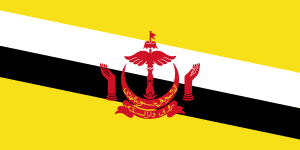 Brunei: Sistem Televisyen Malaysia Berhad TV3 a member of New Straits Times Press (live direct television broadcast transmission)
Brunei: Sistem Televisyen Malaysia Berhad TV3 a member of New Straits Times Press (live direct television broadcast transmission) Italy: RAI
Italy: RAI Chile: TVN, UC-TV
Chile: TVN, UC-TV Argentina: Argentina Televisora Color, Canal 13, Canal 11
Argentina: Argentina Televisora Color, Canal 13, Canal 11.svg.png) Romania: TVR
Romania: TVR
See also
- 1984 Summer Paralympics
- 1984 Winter Paralympics
- 1984 Winter Olympics
- Olympic Games celebrated in the United States
- Olympic Games with significant boycotts
- 1976 Summer Olympics – Montreal – African boycott
- 1980 Summer Olympics – Moscow – United States-led boycott
- 1984 Summer Olympics – Los Angeles – Soviet-led boycott
- Summer Olympic Games
- Olympic Games
- International Olympic Committee
- List of IOC country codes
- Use of performance-enhancing drugs in the Olympic Games — 1984 Los Angeles
People
- Bob Ronka, Los Angeles City Council member, 1977–81, skeptical of hosting the Olympics.
Notes
- ↑ "Games of the XXIII Olympiad". International Olympic Committee. Archived from the original on August 30, 2008. Retrieved August 31, 2008.
- ↑ Burns, John F. (May 9, 1984). "Protests are Issue: Russians Charge 'Gross Flouting' of the Ideals of the Competition". New York Times.
- 1 2 Abrahamson, Alan (July 25, 2004). "LA the Best Site, Bid Group Insists; Olympics: Despite USOC rejection". Los Angeles Times. Retrieved August 17, 2008.
- ↑ "Various – The Official Music Of The XXIIIrd Olympiad – Los Angeles 1984 (LP) at Discogs". Archived from the original on September 12, 2009. Retrieved September 10, 2009.
- ↑ Los Angeles 1984 Olympic Opening Ceremony Complete [Go to time stamp 29:40 for Etta James' performance. A previously cited Associated Press story (in which James was credited for singing the national anthem) was an AP reporting error. The national anthem was performed by a choir, and James appeared to perform 'When The Saints Go Marching In' later in the ceremony.]. YouTube. September 6, 2014.
- ↑ Malone, MacKenzie (July 19, 2012). "Tuning into the Games, Watching the Olympics is the next best thing to playing". Times Union. Retrieved April 4, 2014.
- ↑ Reuters – Li Ning, "Prince of Gymnasts" and businessman – Aug 8, 2008
- ↑ Wolper, Davide (August 12, 2009). "Out of the sky, some Hollywood magic". LA Times. Retrieved December 30, 2015.
- ↑ FLASHBACK 1984: Los Angeles Olympics UFO. YouTube. April 23, 2012.
- ↑ Flyvbjerg, Bent; Stewart, Allison; Budzier, Alexander (2016). The Oxford Olympics Study 2016: Cost and Cost Overrun at the Games. Oxford: Saïd Business School Working Papers (Oxford: University of Oxford). pp. 9–13.
- ↑ "1984 Olympics". infoplease.com.
- ↑ No Olympics No Problem by Andrew H. Levin. April 27, 2007. page 27. Accessed July 24, 2009. Archived July 26, 2009.
- ↑ "Let Boston 2024 pay for the Olympics - The Boston Globe". Retrieved July 28, 2015.
- ↑ Shoval, Noam. "A New Phase in the Competition For The Olympic Gold: The London and New York Bids For The 2012 Games." Journal of Urban Affairs 24.5 (2002): 583–99.
- ↑ No Olympics No Problem by Andrew H. Levin. April 27, 2007. page 13. Accessed July 24, 2009. Archived July 26, 2009.
- ↑ "USOC names Los Angeles the official U.S. bidder for the 2024 Summer Olympics". Los Angeles Times. September 1, 2015. Retrieved September 5, 2015.
- ↑ Hollie, Pamela G. (August 10, 1984). "Advertising; Big Mac's Olympic Giveaway". The New York Times. Retrieved April 20, 2010.
- ↑ "Ignition". NCIS: Naval Criminal Investigative Service. Season 7. Episode 11. January 5, 2010. 43 minutes in. CBS.
- ↑ Stern, Jesse. The Future is Now: NCIS meets the jet pack (NCIS: The Seventh Season (Disc 3 special features)). CBS Studios.
External links
| Wikimedia Commons has media related to 1984 Summer Olympics. |
- "Los Angeles 1984". Olympic.org. International Olympic Committee.
- "Results and Medalists". Olympic.org. International Olympic Committee.
- Olympic Review 1984 – Official results
- Official Report Vol. 1
- Official Report Vol. 2
- Video of President Reagan declaring games open, and torch-lighting by Rafer Johnson on YouTube
Further reading
- Whitakers Olympic Almanack. 2004. ISBN 0-7136-6724-9.
- Henry, Bill. An Approved History of the Olympic Games. ISBN 0-88284-243-9.
- Andranovich, Greg; Burbank, Matthew J.; Charles H. Heying (2001). "Olympic cities: lessons learned from Mega-Event Politics". Journal of Urban Affairs. 23–2.
| Preceded by Moscow |
Summer Olympic Games Los Angeles XXIII Olympiad (1984) |
Succeeded by Seoul |
